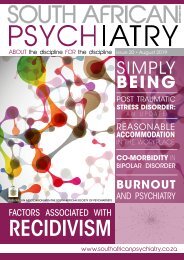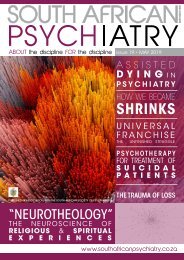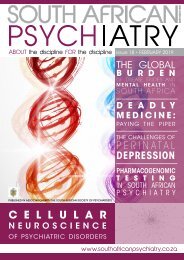South African Psychiatry - November 2018
South African Psychiatry - November 2018
South African Psychiatry - November 2018
Create successful ePaper yourself
Turn your PDF publications into a flip-book with our unique Google optimized e-Paper software.
POLICY GUIDELINE<br />
Furthermore, Section 72(6) of the MHCA allows for<br />
national or provincial departments of health (DOH)<br />
to “enter into agreement with any non-governmental<br />
organisation …to exercise powers and perform<br />
functions and duties under this Act”.<br />
THIS IMPLIES THAT DESIGNATION OF NGOS<br />
TO PROVIDE PSYCHIATRIC OR MEDICAL<br />
CARE SHOULD BE DONE IN AGREEMENT<br />
WITH THE NGO. ADDITIONALLY, SECTION<br />
45(2) OF THE NATIONAL HEALTH ACT<br />
NO.61 OF 2003 (NHA) ALLOWS THE DOH<br />
AND MUNICIPALITIES TO ENTER INTO AN<br />
AGREEMENT WITH NGOS TO ACHIEVE<br />
THE OBJECTIVES OF THE NHA.<br />
However, the Minister has not yet classified NGOadministered<br />
facilities into health establishment<br />
categories, as provided for in Section 35(a)(vi) of<br />
the NHA, and such a process would surely involve<br />
stakeholder agreement with the NGOs.<br />
AGAINST THIS BACKGROUND, WE<br />
HAVE THE FOLLOWING CONCERNS:<br />
1. Neither mental illness nor severe to profound<br />
intellectual disability are included in the<br />
definitions, and other conditions and user<br />
groups which may require similar levels or types<br />
of care are not specified.<br />
2. The definition of ‘‘manager” refers only to “heads<br />
of health establishments”, which may not be<br />
relevant to the socially supportive NGOs with<br />
which this document is concerned. Most of the<br />
said NGO-administered facility managers are<br />
lay people, and not qualified to provide health<br />
services.<br />
3. Related to this is the confusing application of<br />
the guidelines to day-care facilities, defined to<br />
include home-based care, protected workshop<br />
and support groups and means a facility that<br />
offers services, day time activities and social<br />
contact for an individual mental health care<br />
user and groups of mental health care users<br />
for treatment, rehabilitation, prevention and<br />
promotion activities. On this definition, day<br />
care centres would fall within the definition of<br />
a care and rehabilitation centre. But, care and<br />
rehabilitation centres are not within the purview<br />
of these guidelines.<br />
Protected workshops and support groups<br />
only function with the voluntary attendance<br />
of PLWMI and/or ID. Neither are intended, by<br />
their very nature, to provide health services.<br />
The assumption seems to be that all service<br />
users included under the guidelines are in<br />
constant need of medical care, which in itself<br />
is problematic. While ‘home-based care’ may<br />
constitute health care, it cannot be regarded as<br />
a ‘facility’. The Guidelines fail to account for the<br />
range of different services and activities needed<br />
by different individuals, in different contexts and<br />
at different stages of the life course. They also<br />
fail to address the area of overlap between daycare<br />
centres (as described above) and Early<br />
Child Development (ECD) centres. In most rural<br />
and peri-urban communities, community-based<br />
ECD centres offer the only possibility of day-care<br />
for children and youth with disabilities, including<br />
those with severe and profound intellectual<br />
disabilities. Enforcement of the guidelines would<br />
render this impossible, driving either the reinstitutionalisation<br />
of rural children and adults<br />
with disabilities, or the overburdening and<br />
collapse of fragile family and social networks.<br />
Further, <strong>South</strong> <strong>African</strong> educational policy<br />
and international best practice promote the<br />
inclusion of children and youth with disabilities<br />
in mainstream educational institutions wherever<br />
possible. The requirements imposed by these<br />
guidelines would increase barriers to inclusion<br />
and powerfully discourage organisations and<br />
services from accepting PLWMI, including<br />
children and youth. A similar effect is likely to<br />
occur with homeless and ‘abused person’<br />
shelters, which frequently provide housing and<br />
support for PLWMI.<br />
4. The requirement of a Service Level Agreement<br />
(SLA) with the District Health Services in 8.2 is<br />
circular – districts are unlikely to enter into an SLA<br />
with an unlicensed NGO, and yet the SLA is a<br />
pre-requisite for licensing of the NGO.<br />
5. Under 12.2, the guidelines do not specify who<br />
is responsible for the transfer of users out of a<br />
non-compliant NGO, and where they should<br />
be placed. We note there is no plan in place for<br />
government run supported housing of PLWMI<br />
and/or ID. Our observation is that there is a<br />
high demand for NGOs, with a mushrooming<br />
of illegal facilities and no alternative social care<br />
setting. We anticipate that adherence to these<br />
guidelines will result in the mass transfer of users<br />
to government hospitals as well as an increase<br />
in the high numbers of incarcerated or homeless<br />
PLWSMI and/or ID already experienced in <strong>South</strong><br />
Africa.<br />
6. In clauses 15, 17, and 18, and in Annexure B, the<br />
Policy Guidelines expect:<br />
a. PLWMI and/or ID to be admitted to residential<br />
and/or day care facilities under the MHCA<br />
(15.4, 17.2(e), Annexure B page 15 and 20).<br />
The MHCA admission and appeal processes<br />
for assisted and involuntary users are<br />
designed to protect the PLWMI and/or<br />
ID from unjustified restrictive hospital or<br />
institutional care, as under the colonial<br />
era mental health system in <strong>South</strong> Africa.<br />
As the guidelines refer to communitybased<br />
NGOs which take in PLWMI and/or<br />
ID after discharge from a hospital or care<br />
and rehabilitation centre, and which do<br />
not themselves provide restrictive, hospital-<br />
SOUTH AFRICAN PSYCHIATRY ISSUE 17 <strong>2018</strong> * 87

















